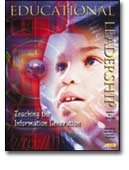Recently, I had to take the written driver's test for the state of Virginia. Nine years ago when I last read the driver's manual, it was 136 pages long. The current edition is only 72 pages, 14 pages of which are devoted to recognizing roads signs. Interesting, that in this major metropolitan area where traffic has increased dramatically in the last decade, drivers are tested on knowing the difference between a yellow triangle and a red octagon.
Don't get me wrong; I don't disagree with the need for knowing the basics in the information age. And, supposedly, the road test assesses the sophisticated skills a driver needs for getting around the Beltway. But when I over-quickly hit a key on the computer-generated test only to find out I had failed the whole thing, I had a slight case of off-road rage. I got over it the next day when I retook the test and passed, though.
It all put me in mind of a current concern for students. Policymakers try to figure out what the I-Generation should know and be able to do, and they prepare tests that in some ways reduce required knowledge to the basics. Meanwhile, information proliferates. Our children need to know more than their parents did to have an adequate understanding of science, just to mention one subject. The skills they need are more sophisticated, too.
In a recent press release, the search engine Google.com claims to have indexed a billion unique URLs. This means that "you can search the equivalent of a stack of paper more than 70 miles high in less than half a second." A survey conducted by the NEC Research Institute estimates that there are more than 1 billion Web pages today. Of course, no one has defined what constitutes a Web page yet. We can count the bytes in a given document, but how much knowledge is in it is a matter of interpretation.
Almost 95 percent of the nation's schools are now connected to the Internet (Cooper, 2000). Students are taking virtual field trips to historic sites and gaining access to original scientific research. Students who learn visually, students with disabilities, and shy students who otherwise might not participate in classroom discussions are among those who may be learning more from Internet access. "Researching a topic on the Web can lead students to spontaneous discoveries of related information drawn from more than one academic subject, similar to browsing through open stacks in a library," the Washington Post reports.
A National Public Radio Poll (2000) confirms children's comfort with computers. Eighty-five percent report that they are keeping up with the latest technology contrasted with 49 percent of adults who say that they are keeping up. Compared with adults (38 percent), children have more trust in the information on the Internet (56 percent) and less concern about violent games (39 percent for kids, 56 percent for adults). The survey also reports that parents are more likely than their children to think that adults have rules in place about what their kids can do on the computer.
This issue of Educational Leadership is about the need to make sure that students have access to technology and the coping skills to negotiate information overload. Students today need to be able to critically assess the information they read, whether on the Internet or in traditional books. They need to interpret and present data that is graphically displayed (see Jason Ohler's "Art Becomes the Fourth R" p. 16). They need to know whether their information source is biased and to what extent (see "Commercialism@Schools" by Alex Molnar and Jennifer Morales, p. 39). And they need to have a strong sense of values as well as the facts when it comes to making decisions that affect their survival (see the special section on sexuality education, pp. 60–79).
Parents and teachers are no longer their children's primary gatekeepers to information, but, as Jane Healy reminds us (p. 8), they are needed more than ever to teach children the skills that will help them sort and make sense of conflicting opinions and data. Educators play a vital role in connecting the traditional and valued learning of the past to the exciting new relevance students find in learning through technology. Teachers are the ones who can encourage students' enthusiasm for learning while urging carefulness with the technology that brings them the world at their fingertips.
